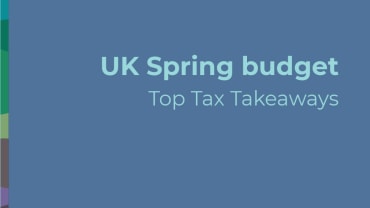The UK Mini-Budget delivered today by Chancellor Kwasi Kwarteng included a range of important announcements. Here are our top tax takeaways:
- Major income tax changes were a combination of "expected but early", in a reduction of basic rate from 20% to 19% from 6 April 2023; and "completely unexpected" in the removal of the additional rate of 45% (and the additional dividend rate of 39.1%) from the same date. Rates for Scottish taxpayers on earned and property income from 6 April 2023 remain to be fixed by the Scottish Government.
- National Insurance Contribution (NIC) rates will be cut by 1.25% for employees, employers and the self-employed, reversing the increase introduced in April 2022 for the rest of the year. The ring-fenced Health and Social Care Levy of 1.25% due to be introduced from April 2023 will no longer go ahead.
- The planned increase in corporation tax from 19% to 25% from 1 April 2023 will not go ahead, with the scheduled change to the rate of the Bank Corporation Tax Surcharge also cancelled.
- Recent dividend tax rate increases will be reversed from 6 April 2023 and the highest (additional) rate of dividend tax will be abolished, making the rates 7.5% and 32.5%. This reversal, which is linked to the reversed increase in NIC/Health and Social Care Levy, affects Scottish taxpayers as well as those in the rest of the UK.
- The UK Government will work with other authorities to introduce “Investment Zones” across the UK. Investment Zones will among other things carry a number of tax incentives. These will include: (i) some 100% SDLT reliefs (England & NI only – this is devolved to Scotland and Wales where decisions have yet to be taken); (ii) no business rates for occupiers of new properties (similarly devolved); (iii) enhanced capital allowances; and (iv) a zero rate of employers’ NICs for new employees earning up to £50,270.
- The capital allowances annual investment allowance for qualifying plant and machinery will permanently remain at £1,000,000 and will not reduce to £250,000 as previously intended.
- SDLT is to be cut on residential properties. The residential nil rate band will be permanently increased from £125,000 to £250,000. The first-time buyers’ relief will be extended so that the first £425,000 will be outside of tax, and the upper limit for properties benefitting from the relief will increase to £625,000. As land transaction taxes are devolved, it is up to the Scottish and Welsh Governments whether equivalent measures are introduced.
- Off-payroll working rules (also known as “IR35” reform) introduced in 2017 for the public sector and 2021 for the private sector will be repealed from 6 April 2023, placing the responsibility for determining employment status back onto the off-payroll workers.
- From April 2023, the limit for companies raising Seed Enterprise Investment Scheme (SEIS) investment will be increased to £250,000. Companies with gross assets of up to £350,000 will now qualify with an increased age limit of companies from two to three years. The individual investor limit will be doubled to £200,000. Enterprise Investment Scheme (EIS) and Venture Capital Trust (VCT) reliefs will extend beyond 2025.
- The limit on options granted under tax advantaged Company Share Option Plans (CSOP) will be increased from £30,000 to £60,000, with restrictions on the type of shares which qualify to be relaxed.
- VAT free shopping will be introduced for overseas visitors. This scheme will enable overseas visitors to obtain VAT refunds on goods bought in high street shops, airports and other departure points.
- Alcohol duty will be reformed, with implementation from 1 August 2023. The UK Government will freeze alcohol duty rates for all categories (e.g. beer, wine, cider, spirits) from 1 February 2023.
Contributors
Alan Barr
Partner
Neil Ritchie
Director of Personal Tax
Karen Davidson
Partner
Bob Langridge
Partner
Isobel d'Inverno
Director of Corporate Tax
Armando Goncalves
Senior Solicitor
Scott Bell
Senior Solicitor
Leigh Gould
Partner


















